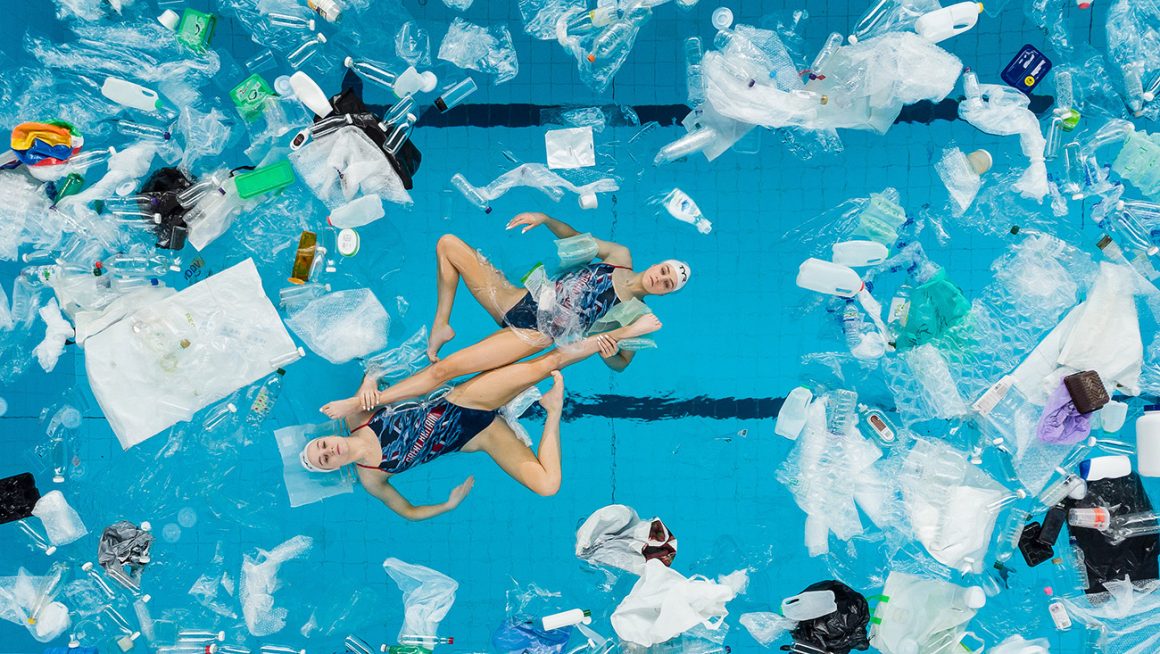
Synchronized swimmers complete routine in pool full of plastic to raise environmental awareness
By Mariah Wilson, April 23 2019 —
Since 1970, Earth Day has been celebrated around the world and is used as a starting point to discuss the health of our planet and ways we can change our daily habits for the betterment of the natural world. These discussions range from teaching children to reduce, reuse and recycle, to op-eds that focus on critiquing a country’s environmental policies.
It’s not common to see sports brought into this discussion — especially a sport as unconventional as synchronized swimming. Yet, British synchronized swimmers Kate Shortman and Isabelle Thorpe paired up with The Big Bang Fair to highlight how the ocean’s plastic is affecting marine life by completing their World Championship routine in a swimming pool full of plastic.
The Big Bang Fair takes place in March of each year in England, showcasing the work of up-and-coming youth in the field of science, technology, engineering and mathematics through a competition that encourages young people to think of creative solutions for both local and global issues.
The Big Bang Fair explains that Shortman and Thorpe performed in a training pool filled with hundreds of single-use plastic drinking bottles, plastic toiletries, plastic bags and plastic food containers. This performance was intended to highlight the struggle, and the potential danger, of trying to swim through water that is filled with plastic. At many points throughout their routine, you can catch glimpses of plastic items wrapping around the swimmers’ limbs, inhibiting them from executing a perfect routine.
Their performance is thought-provoking and makes it visually apparent how difficult it is for marine life to survive in their ecosystem because of human’s inability to effectively manage our waste. In a video posted by the Big Bang Fair, many interviewees discussed feelings of guilt for not taking better care of the environment, as well as a responsibility for denying future generations the opportunity to enjoy the natural world as they did.
The organization Earth Day reports that roughly eight million metric tonnes of plastic are thrown into the ocean annually, which poses a significant problem to marine life since they find it hard to distinguish common plastic items from their food. When marine organisms eat plastic, they are unable to digest it. It takes up space in their stomachs leaving no room for any food.
Even more troubling, the Ocean Legacy Foundation details that more mammals are dying and washing up on shores each year with stomachs full of plastic. To put this into numbers, more than a million seabirds and over 100,000 marine mammals die annually from the presence of plastic in the oceans — and this number is only set to increase as oceans become more polluted.
But it isn’t all doom and gloom.
Luke De Bretton-Gordon, a participant in The Big Bang Fair, invented an edible membrane that can replace plastic bottles. This edible membrane can be consumed after the user is done drinking the water in their bottle, and even if it does end up in the ocean, marine life can safely consume it. This is conceptually similar to the edible six-pack holder that Saltwater Brewery released a few years ago to inhibit the number of marine animals that get their necks stuck in plastic six-pack rings.
As the degradation of the world’s ecosystems becomes even more prominent in our daily lives, it’s important to have performances, discussions and deliverables that shine light on the issues our world faces and how we can take action. While it isn’t made apparent how much energy and resources need to go into producing this edible membrane — making it hard to discern the cost-benefit of its production — it would be a small step forward in the right direction.
